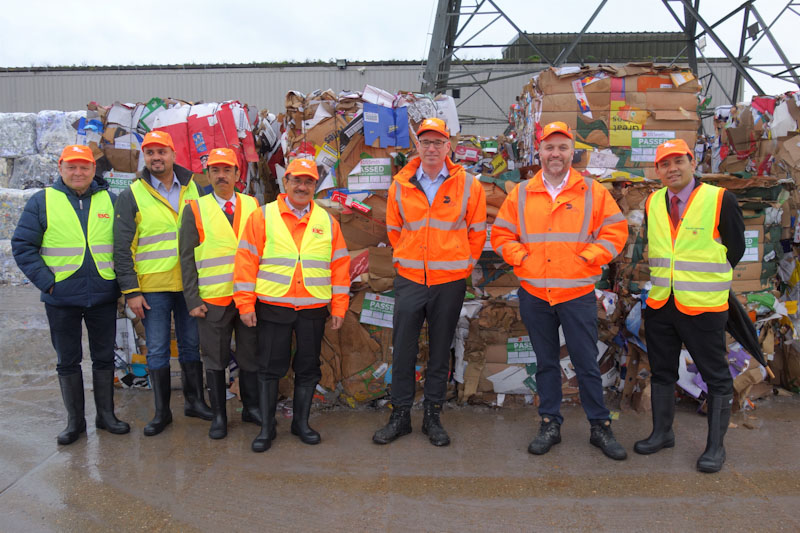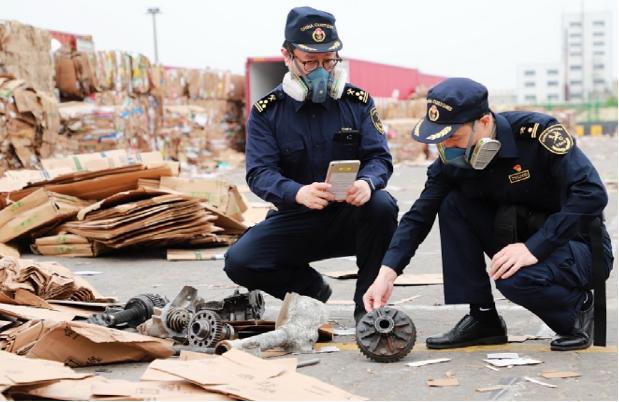Two of the latest developments in terms of waste exports have seen Indonesia allow a 2% contamination on waste commodity imports and China restate its work to stop of the import of ‘illicit waste’.
Indonesia
Details of the Indonesian 2% limit have emerged from the US recycling trade association group, ISRI, which has strongly welcomed an announcement from the Indonesian government.

The Indonesian trade mission visited DS Smith in December.
The agreement on a 2% limit has also been welcomed by the UK’s Recycling Association which took part in a joint delegation with ISRI to Indonesia last year. And, in December 2019 a delegation from Indonesia visited companies in the UK including DS Smith.
There were fears that exports from the US and Europe to Indonesia might have been limited on an ongoing basis to a 0.5% contamination or contrary rate which could disrupt material flows.
‘Major win’
ISRI said: “In what amounts to a major win for manufacturers, recyclers, and those purchasing goods with recycled content, the Indonesian government has confirmed the use of a two percent contamination rate for scrap commodity imports. As the voice of the recycling industry, the Institute of Scrap Recycling Industries (ISRI) applauded the joint decree by the Ministry of Trade, the Ministry of Environment & Forestry, the Ministry of Industry and the government’s Head of State Policy.”

Adina Adler of ISRI has welcomed the Indonesian announcement
Adina Renee Adler, vice president of advocacy for ISRI explained: “This policy allows for Indonesia’s vibrant paper manufacturing sector and others that rely on environmentally-friendly manufacturing inputs to fulfill their requirements for specification-grade commodities.”
She continued: “Many commodity grades are not available domestically and manufacturers must rely on the global supply to produce goods. This reaffirms the essential value of scrap commodities to the manufacturing supply chain and rejects the approach taken in China and elsewhere to treat these commodities the same as solid waste.”
The decree announced on May 27, includes the following provisions:
- Contamination tolerance of two percent for scrap commodity imports.
- Creation of an inter-agency task force that, within six months, will develop a “road map” geared toward greater self-sufficiency through increased domestic supplies while also reducing imports through a quota system and tighter contamination thresholds.
Pragmatic
Simon Ellin, chief executive of the UK’s Recycling Association, said: “I’m pleased that our work to get a pragmatic solution for exports to Indonesia working with ISRI has borne fruit. We are going to have some understandable and tangible guidelines and pragmatic ones that we can meet in terms of quality.”
“We are going to have some understandable and tangible guidelines”
Simon Ellin
Chief executive, Recycling Association
However, Dr Ellin said that he believed the “overriding message is that Indonesia is going to import less and less and will move towards a 0.5% rate. While this reinforces the need for high quality export, it also reinforces the need for the UK to plan ahead because of the important of south east Asia as export markets for recovered paper.
“The message out there is that south east Asia door is gradually closing and closing. This needs to be discussed at a very high level – it is about time that the UK government in the wake of Brexit should be doing trade deals with the message that countries have a duty to take back material for recycling if they are still exporting.”
The Indonesian decree can be seen HERE
China
China continues to emphasise its move away from the importing of what it calls solid waste, which includes materials for recycling.
Yesterday (17 June) the country’s General Administration of Customs (GAC) released figures for the first part of the year saying that under the “Blue Sky 2020” campaign, “Guangdong Sub-Administration and 12 participating Customs Districts (in 9 provinces/municipalities) totally busted 38 smuggling syndicates, captured 80 criminal suspects and seized 598,800 tons of illicit inbound waste such as waste oil and slag, in an intensive, clustered and full-chain manner.”

Hangzhou customs said they found non-acceptable materials in used cardboard from the US (picture: China General Administration of Customs)
Last month (May 13), said the GAC, Hangzhou Customs intercepted a batch of “environmentally-substandard waste paper at the port of Jiaxing, marking its second seizure of import substandard waste paper since the beginning of the Blue Sky 2020 campaign against illegal inbound waste.”
The GAC explained that “ waste paper was used corrugated cartons imported from USA by a Jiaxing enterprise, which was usable as raw materials, totaling 204.3 tons in 20 TEUs. Through field inspection at Jiaxing Customs House, it was found that these waste paper had an excessive inclusion content of 2.06%, far more than the standard limit of 0.5%, and thus incompliant with relevant environmental requirements. By now, the Customs has returned this batch of waste paper outward by issuing the quarantine disposal notice.”
The customs authority warned that “In the next stage, China Customs will continue the crackdown on criminal smuggling of illicit inbound waste by deepening law-enforcement cooperation with domestic and foreign authorities in an intensive long-acting mechanism, so as to safeguard domestic eco-environment and human health.”
Imports to China of materials, such as waste paper, are due to end later this year.
The post Indonesia allows 2% tolerance rate for imports appeared first on letsrecycle.com.
Source: letsrecycle.com Plastic



